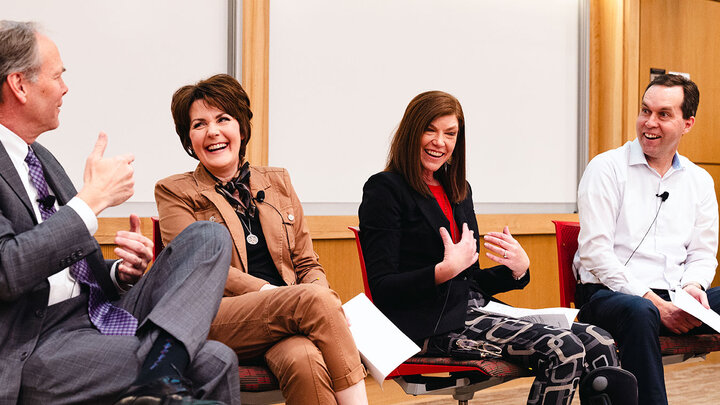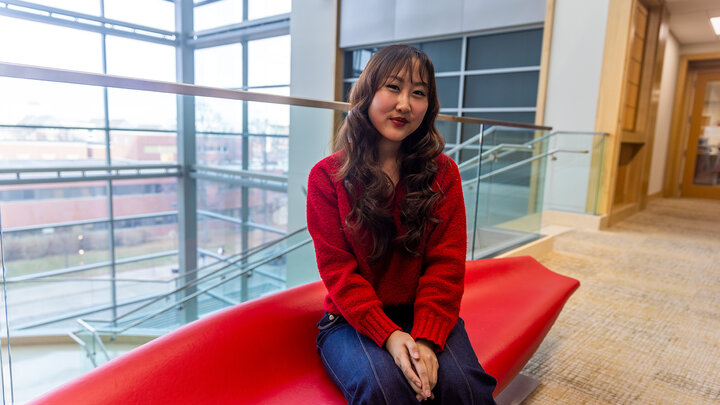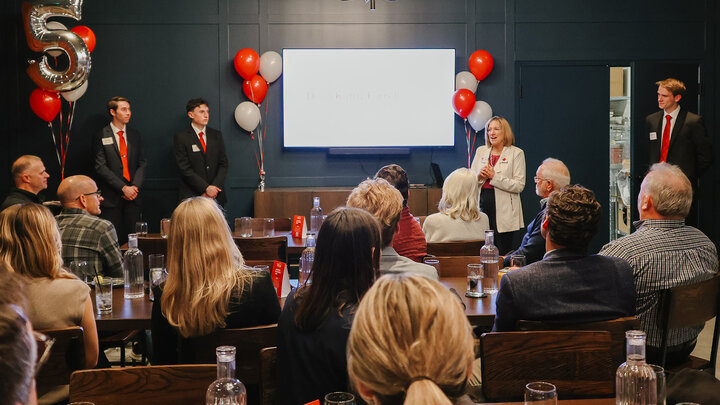Four actuarial science alumni who currently lead companies shared their insight and advice with University of Nebraska–Lincoln students at Howard L. Hawks Hall in the spring.
The panel included James Blackledge, '88, chairman and CEO of Mutual of Omaha; Mary Hegemann, '96, CEO of Wakely; Robert Jurgensmeier, '95, chairman and CEO of Ameritas; and Susie Keisler-Munro, '87, CEO of Assurity.
James Blackledge, '88, Chairman and CEO of Mutual of Omaha
A native of Omaha, Nebraska, Blackledge shared how he always enjoyed math, so he started out as an engineering student like his brother. One day he walked by the actuarial science office at the university.
"My curiosity got the better of me, so I asked what it was about. Warren Luckner (former director of the Nebraska Actuarial Science program) was there and said, 'This is a way you can use your math to help people.' That just stuck with me. He was gracious enough to have me as an independent study student on Fridays because I was on the track team and couldn't take the afternoon courses when track practice was happening," said Blackledge, who won the 1988 Big Eight indoor high jump championship at Nebraska.
After graduation, he started his career as an employee benefits consultant at Mercer in Kansas City. He moved to Mutual of Omaha so he could spend more time studying for the actuarial science exams and thought he would stay a few years.
"I've been at Mutual of Omaha for 34 years. I started out as a group valuation actuary and became the group actuary with all the functions in the group insurance operation reporting to me. Later I had a similar role for the individual insurance operation. Then I became the chief risk officer, and then I got this job nine years ago," Blackledge said.
Blackledge said his education and early career helped him learn about how a company works and makes money and how the financials come together. He shared how it prepared him to be a CEO, and he still uses the knowledge today.
"There are opportunities in college you take because you learn a lot about leadership in the doing, not in the reading about it. You learn who you are as a leader from doing too. One of the most important things is to be yourself. Be authentic and find out what kind of leader you want to be," he said.
He advised students to get to know the people they work with as that network is valuable, especially over time.
"It's amazing how the people you work with over the years come full circle as you move to different parts of the organization. It's important as an actuarial science student to not just focus on the numbers but the people as well," he said.
Mary Hegemann, '96, CEO of Wakely Consulting Group
Hegemann was raised on a farm outside of Belvidere, Nebraska, and went to school in Hebron at what now is called Thayer Central High School. She took calculus and computer programming in high school, and her math teacher brought in professionals in different fields involving math.
"The teacher knew my family and came up to me after actuarial science was presented and said, 'Mary, I think you should really consider this, as the university has a great actuarial science program. As a professional and an actuary, you will be respected in this industry, and that resonated. I also got a four-year scholarship," she said.
After graduation, she headed to Denver and spent three years at an insurance company. She then joined the world of consulting.
I started consulting with a very small 10-person, women-owned company, where l learned I loved nonprofit work. I love working on different projects with a great variety. Then I went to work for a large public company for two years and then helped build up Wakely Consulting Group for about 16 years now," Hegemann said.
Hegemann shared how her education prepared her to do good work and seize opportunities. She also learned that if you are going to talk in front of people, you better be prepared for at least two questions to come back to you, so you should be prepared and dig deep into the subject.
"It's great to dig into projects, but sometimes it's really hard to see the big picture, and you can lose sense of the why. I encourage people to force the conversation with your team, so you don't limit the learning. Find out the bigger why of what you are doing so you can make it better," Hegemann said.
Robert Jurgensmeier, '95, Chairman and CEO of Ameritas
Born and raised in Hastings, Nebraska, Jurgensmeier found actuarial science during his freshman year of college. At the time, he was attending another institution that did not have the degree, so he transferred to Nebraska to pursue it.
"I was really good at math, but knew I wanted to be in the business world. I looked at all the degrees and wanted to get rewarded for what I thought was a differentiator for me. An actuarial career was rated No. 1 every year so I jumped in," he said.
After graduation, he worked as an associate actuary at Principal Financial Group in Des Moines, Iowa. He shared how he rotated through a number of roles and got closer to the sales side of the organization.
"I moved back to Nebraska in 2011 and landed at Lincoln Benefit Life. Then, in 2012, I went to Ameritas. The chief actuary position for the product part of their organization opened up, so I took that and bounced around through several roles over 12 years in and out of the actuarial world," he said.
He said his actuarial science education at Nebraska helped prepare him for becoming a CEO.
"I'd say critical thinking is my number one strength, and some of that is innate, but some of it is the way actuarial education makes you think about things. The insurance business is complex, and our skillset and mindset are a good fit for running a company," he said.
His advice to students is to get involved and be ambitious when taking advantage of the many opportunities offered in college, such as internships.
Susie Keisler-Munro, '87, CEO of Assurity
Keisler-Munro was born in Baton Rouge, Louisiana, but mostly grew up in Fremont, Nebraska. Having earned an undergraduate math and economics degree at Nebraska Wesleyan University, she decided to go into the actuarial profession and pursued a master of science degree in actuarial science from Nebraska.
"I decided going to school was the right thing to do, even though I didn't need a master's degree, because I hadn't taken any specific coursework (in actuarial science). My interest in the actuarial profession came twofold. My father was a mathematics professor at Midland Lutheran College in Fremont, and I had a piano teacher for 12 years who had a daughter who was an actuary. She helped connect the dots for me," Keisler-Munro said.
Once her husband graduated from the Nebraska College of Law, they both traveled the country to find the best opportunities for their future. They both took jobs in Lincoln, thinking they would stay only a few years.
"I started out in an entry-level role and did various financial reporting work as well as product pricing work. I ended up leading the actuarial team on the product and pricing side and then ultimately stepped into assuming more responsibilities," she said.
She moved to information technology for a while and then served as chief of operations for 17 years, embracing the various disciplines at the company before taking the helm.
"I always experienced the most growth in taking on opportunities where I felt the least prepared. Whether students are in a leadership role or not, any of the things you participate in while in college gives you opportunities to work collaboratively with others to make decisions, execute decisions and be held accountable for the results," Keisler-Munro said. "All those experiences are going to benefit you in the future."




